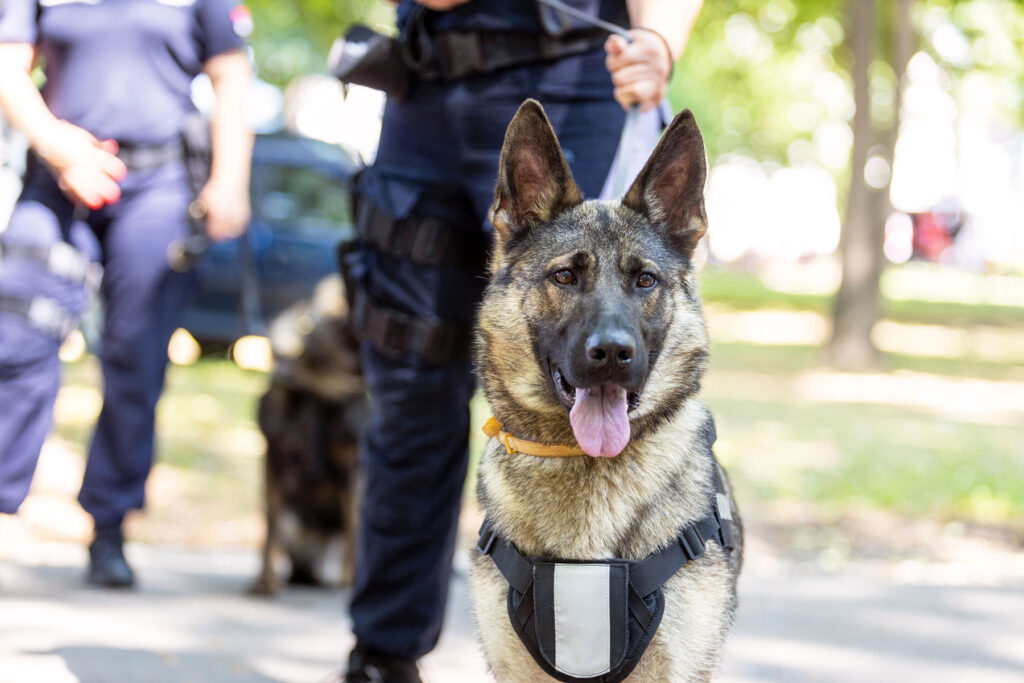
Police dogs may be used to detect drugs, but searches may be a violation of a person’s rights
Police investigation of controlled substance offenses (drug charges) often involves the use of trained police dogs to detect the presence of narcotics, marijuana, and other illegal drugs. For example, when a police officer makes a traffic stop and then suspects the presence of illegal drugs in the car, it is common to call in a canine officer with a police dog to sniff the car to detect drugs. If the dog alerts to the presence of drugs, that normally justifies a careful police search of the car. Defending these cases requires scrutiny of whether the police had sufficient legal justification to bring in a dog. Because if they didn’t, then the dog sniff and the resulting vehicle search may have been a violation of the driver’s constitutional rights. In other words, the evidence of drug possession might have been illegally obtained, and the state cannot use illegally obtained evidence to prosecute someone. Any evidence obtained from an unconstitutional search must generally be suppressed. State v. Jackson, 742 N.W.2d 163, (Minn. 2007).
How is the legality of a drug sniff search decided?
The law allows a police officer to expand the scope of a traffic stop beyond its original purpose if an officer has a reasonable, articulable suspicion of other criminal activity. State v. Wiegand, 645 N.W.2d 125, 135 (Minn. 2002). Each incremental intrusion of a person’s privacy rights during a traffic stop must be strictly tied to and justified by the circumstances that made the traffic stop permissible in the first place. State v. Askerooth, 681 N.W.2d 353, 364 (Minn. 2004). Any use of a dog sniff to determine if there are controlled substances present must be supported by reasonable, articulable suspicion of drug-related criminal activity. Reasonable suspicion requires more than a police officer’s mere hunch. State v. Taylor, 965 N.W.2d 747, 752 (Minn. 2021). The court must consider the totality of the circumstances.
A recent decision highlighting a violation of constitutional rights
A recent decision by the Minnesota Court of Appeals provides an interesting review of the law regarding use of a drug sniffing dog in a traffic stop. In State v. LaPointe, A22-0459, (Minn. App. 2/27/2023), a police officer was stationed in a highway median conducting traffic surveillance when a car caught his attention. The car was driving in the left lane but slowed down as it approached the officer’s location. After the car passed, the officer stopped it because it had darkly tinted windows, a loud exhaust, and had slowed down. When the driver questioned why he was being stopped the officer told him it was for equipment violations, but he would not be writing a ticket. The officer told the driver to get out of the car and the driver became irritated and argumentative, stating that law enforcement had been harassing him and killing people. The facts are more extensive and an interesting read, but eventually the police called in a drug sniffing dog that alerted to the presence of methamphetamine in the car.
The driver argued at court that the expansion of the scope of the traffic stop to involve a drug sniffing dog was illegal, so the evidence was illegally obtained and the case should be dismissed. The judge denied the motion to suppress evidence. The driver appealed – and won. The Minnesota Court of Appeals agreed that the use of a drug sniffing dog in that case violated the driver’s constitutional rights, and the charges were dismissed.
Do you have questions about police dogs and drug sniffs? Contact Bill Sherry for advice.
If you have questions about the legality of any search for drugs – whether a home, a business, a car, or someone’s purse, luggage, backpack, or pockets, contact Bill Sherry for a free consultation. If there is a valid argument that someone’s constitutional rights were violated, it is possible that charges could be dismissed.
As an experienced Minnesota criminal defense attorney, Bill Sherry understands that legal problems don’t always happen during ordinary office hours. If you are facing a legal problem and need to talk with a lawyer right now, call Bill Sherry at 952-423-8423 for a free consultation.

